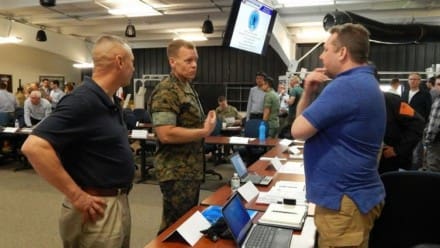Defense experts from around the globe gathered at Marine Corps Systems Command April 5-7, to share information and work toward common solutions for complex issues across allied forces.
The North Atlantic Treaty Organization Land Capability Group on Dismounted Soldier Systems convened at MCSC’s Gruntworks Squad Integration Facility aboard Marine Corps Base Quantico. Representatives from 20 countries and three continents discussed standardization of common capabilities and issues for coalition Marines and soldiers worldwide. LCG DSS is part of the NATO Army Armaments Group, one of the three main armaments groups subordinate to NATO’s Conference of National Armaments Directors. NAAG’s mission is to support nations in achieving the objectives of NATO land force armaments cooperation. It promotes interoperability of alliance and partner armed forces by means of information exchange, materiel standardization and cooperative activities.

Brig. Gen. Joseph Shrader, commander of Marine Corps Systems Command, speaks with leaders of the North Atlantic Treaty Organization Land Capability Group on Dismounted Soldier Systems during the group’s biannual meeting aboard Marine Corps Base Quantico on April 5. LCG DSS is part of the NATO Army Armaments Group, one of the three main armaments groups subordinate to NATO’s Conference of National Armaments Directors. NAAG’s mission is to support nations in achieving the objectives of NATO land force armaments cooperation. It promotes interoperability of alliance and partner armed forces by means of information exchange, materiel standardization and cooperative activities. (U.S. Marine Corps photo by Emily Greene)
Brig. Gen. Joseph Shrader, commander of MCSC, kicked off the three-day session with a warm welcome to attendees and provided a glimpse into the priorities of the Marine Corps.
“Our Marine Corps Operating Concept sets forth our commandant’s four directives,” said Shrader. “The future of the Corps is focused on being more capable, more networked, more resilient and more lethal. Those are the things I think about on a daily basis.”
Shrader placed emphasis on the mission of the Marine Corps rifle squad; which is to locate, close with and destroy the enemy by fire and maneuver or to repel the enemy’s assault by fire and close combat. He said the question lies in how to continue accomplishing that mission as technology constantly develops, often adding to the load of the Marine even as it provides increased capability.
“Technology is a tremendous force multiplier, but it can also be a detractor,” Shrader said. “Additional technologies and capabilities often add weight and size to the load our Marines carry. What you are doing here this week is essential to the future success of our forces.”
Shrader was joined by Timothy Goddette, deputy program executive officer at the Army’s Program Executive Office Soldier.
“This group is all about the soldier, the sailor, the Marine. And not just the soldier, but the dismounted soldier,” said Goddette. “The time you spend here this week, and throughout the year is all about lightening the load, making the soldier more lethal, and providing better protection. It’s like the old carpenter’s motto, ‘Measure twice, cut once.’”

Members of the North Atlantic Treaty Organization Land Capability Group on Dismounted Soldier Systems examine a prototype for exoskeleton technology April 5, aboard Marine Corps Base Quantico. During the three-day session, representatives from 20 countries and three continents discussed standardization of common capabilities and issues for coalition Marines and soldiers worldwide. LCG DSS is part of the NATO Army Armaments Group, one of the three main armaments groups subordinate to NATO’s Conference of National Armaments Directors. (U.S. Marine Corps photo by Emily Greene)
Goddette said the group’s work served two important purposes: increasing the effectiveness of coalition forces and reducing defense costs.
“Every dollar we waste on something that doesn’t work is a dollar we could have spent on a soldier or Marine,” Goddette said. “We have to get it right the first time.”
LCG DSS members were also given opportunities to view new technologies that hold potential for future force enhancement and forums in which to share lessons learned and best practices.
“The LCG DSS meetings provide an important opportunity for us to come together as partner nations and share our hard-earned knowledge so that we all can benefit from it,” said Mark Richter, LCG DSS chairman and MCSC Marine Expeditionary Rifle Squad director. “I think we can all agree that our aim is to create systems that will work together in a coalition environment. These meetings are a key factor in facilitating that cross-collaboration.”
Story from www.marcorsyscom.marines.mil
Tags: MARCORSYSCOM, NATO

